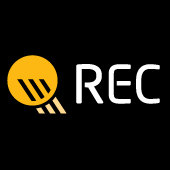
Triple confirmation of sustainability: three REC solar panels receive Environmental Product Declarations (EPD)
EPD: what is it?
The international EPD system is a global program for environmental declarations. Each declaration summarizes the environmental impact of all components of a finished product, production process and transport. Being independently verified, EPDs provide stakeholders in the solar industry with a valuable source of data for objective comparisons. They also serve as confirmation of the low carbon footprint (LCF) of solar panels.
Innovation for sustainability: new products gain EPDs
Jan Enno Bicker, CEO at REC Group says: “At REC, we believe that as the solar industry grows in importance, so does our responsibility to be more sustainable. Today’s customers understand that while going solar is doing good, how much good can vary greatly. As such, REC constantly renews its product portfolio in order to increase power while being cautious about the consumed resources. All three products that have gained EPDs were launched last year, testifying to the success of REC’s continuing efforts to make its own production and the entire solar industry more sustainable, and to rise to the challenge of LCF design and production.”
The REC TwinPeak 4 gained its EPD on the basis of the solar-grade silicon manufactured by REC in Norway using REC’s unique kerf upcycling. With this technology, REC can convert kerf, waste material of the wafer production process, to high-quality solar grade silicon, drastically reducing carbon emissions by up to 96% compared to the standard Siemens process1. Silicon production is the most energy-intensive step in manufacturing solar panels, so improvements make a major difference.
EPDs take into account a specific entire supply chain for a product. In the case of REC Alpha Pure, the EPD is based on polysilicon coming from Germany, cells and modules being manufactured in Singapore and installation done in Europe for example. Another aspect, why the REC Alpha Pure is more sustainable, is because of the eliminated lead content, making the solar panel also RoHS compliant. The issue: even today, a solar panel typically contains a small amount of lead in relation to its total weight. On a large scale, the impact by the solar industry can be significant, particularly when solar panels are recycled at the end of their service life.
Growing demand for sustainability
After 25 years in the industry, REC is seeing growing demand from the market for more sustainability along the entire solar value chain, from production to end of life. Given that REC’s products have a lifetime of 25 years and more, it is essential to take a long-term view. EPDs, which take into account the entire supply chain for the product, not just the manufacturer’s own processes, provide decision makers with guidance on long-term sustainability. They are also increasingly becoming a gateway requirement for project developers to bid for deals.
To learn more about REC’s commitment and contribution to a more sustainable solar industry, please visit www.recgroup.com/csr.
1 https://en.wikipedia.org/wiki/Polycrystalline_silicon
For global inquiries please contact:
Agnieszka Schulze
Head of Global PR, REC Group
Tel.: +49 89 4 42 38 59 39
E-mail: agnieszka.schulze@recgroup.com
REC Solar EMEA GmbH
Balanstr. 71a
81541 Munich, Germany
Managing Director: Cemil Seber
Court of Registration: Munich HRB 180306
VAT ID-No: DE266243545
About REC Group:
REC Group is an international pioneering solar energy company dedicated to empowering consumers with clean, affordable solar power through high-quality solar panels with a leading power density. As Solar’s Most Trusted, REC is known for its patented innovations and multiple award-winning products with reliable long-term performance. The cornerstone for REC’s strong reliability is advanced and highly efficient manufacturing using Industry 4.0 practices. Founded in 1996 in Norway, REC has always been committed to a low carbon footprint in its solar materials and panels. REC is headquartered in Norway with operational headquarters in Singapore and regional hubs in North America, Europe, and Asia-Pacific.